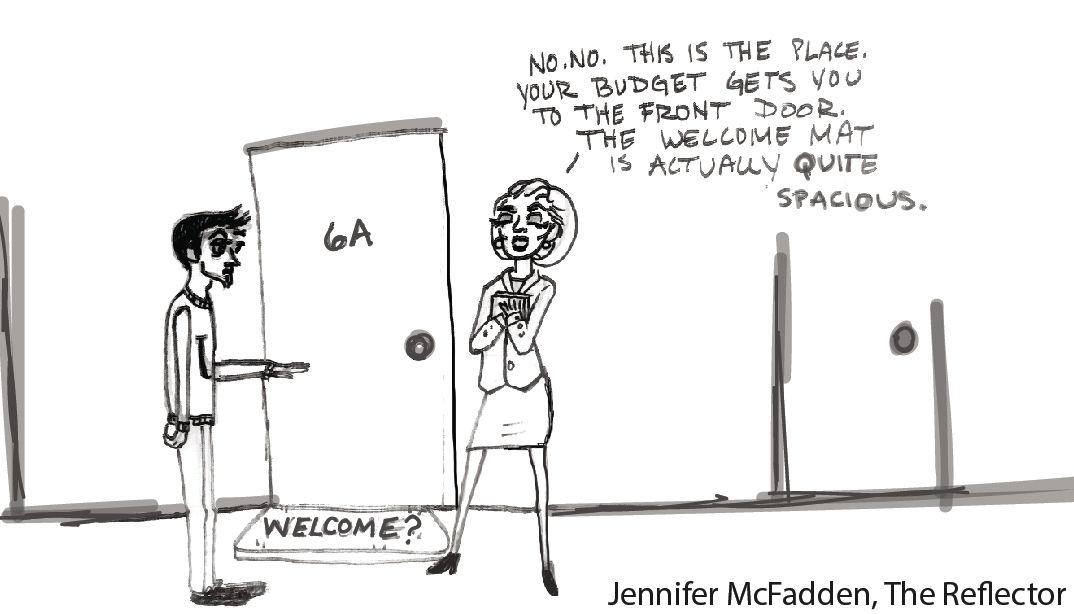As my fellow seniors and I look forward to graduation this May, many of us plan to move out of the state of Mississippi. Considering the criticism I have heard (or perhaps said myself) about Mississippi, there is no denying this state has cheap housing prices.
According to average home listing price data for U.S. states compiled by Trulia.com, Mississippi is 44th out of 50, meaning only six states have an average listing price lower than us. So, it should come as no surprise to most of my peers they can likely expect to pay higher prices for their housing if they are moving out of Mississippi.
However, in recent years, there has been increased commentary on the often ridiculous rise of housing prices in many of America’s largest cities.
According to an article by Andrew DePietro for Forbes, rental costs in big cities have taken up an increasingly larger part of household income. In Seattle, when looking at the time span 2010-2016, median rent rose from taking up 36.8 percent of monthly earnings to requiring 42.6 percent. The same was true for Denver, where median rent increased from 36.5 to 45 percent of monthly earnings during the same time period.
What is to blame for these price increases? In my eyes, as well as many other commentators, the blame rests on groups known as “NIMBYs.” NIMBY is an acronym for “not in my backyard.” Although they do not formally go by this moniker, it is not hard to find people espousing the core beliefs of NIMBYism at many local political meetings in large cities.
Many of these beliefs can simply be boiled down to “we do not want you to build X or Y in our community or neighborhood.” While NIMBYs were at one point simply standing up for safer neighborhoods or historical monuments, they have evolved into groups which help to impose large amounts of land-use regulations in big cities.
These regulations have in turn contributed to raising the costs of housing in cities, because new housing units have become increasingly difficult to build.
According to an article by Richard Florida at CityLab, these regulations not only hinder the construction of new houses and apartment complexes, but the regulations can also hold back the development of cities as a whole.
As Florida writes, “Schools, sewer lines, electric power grids, and, even more importantly, the transit and subway lines required to move people around get much costlier to develop as a place grows bigger.”
Basically, the spillover effects of higher housing prices can grow quite rapidly.
It is also important to remember these NIMBYs can accrue some economic benefits from these regulations. With the supply of new housing limited, those who already own property in large cities will see the value of their property increase dramatically. This will obviously work in their favor when they look to sell their property.
The main concern of the rising housing prices though is many potential residents are being priced out of our major cities. This could prove to be harmful to young professionals of our generation who may receive job offers in large metropolitan areas.
Nevertheless, I am of the persuasion it is well within people’s power to reverse these negative trends. Advocating for the rolling back of zoning laws and land-use regulations would be a huge step forward. If developers are allowed more freedom to build more housing units and apartment complexes, this could easily help mitigate the supply constraint faced by many big cities.
It might also be in the interest of the cities to subsidize construction of housing for low-income residents as they also pursue deregulation.
According to Noah Smith at Bloomberg View, a good model for consideration is Tokyo, Japan.
In Tokyo, they were able to greatly increase the number of dwellings in the city since the 1980s, which has kept housing prices low in comparison to other major cities across the developed world. They followed the same policy prescriptions I previously laid out, by deregulation and simplifying zoning laws. Smith also notes how Tokyo pushed for building dense housing close to transit hubs, which made it easier for more residents to take advantage of transportation options.
So do not fear, fellow graduates. Prices for housing may be high in big cities, but there are clear-cut ways to mediate this. Our bank accounts will thank us down the road.
Housing prices in big cities could limit college graduates
Donate to The Reflector
Your donation will support the student journalists of Mississippi State University. Your contribution will allow us to purchase equipment and cover our annual website hosting costs.





















































































